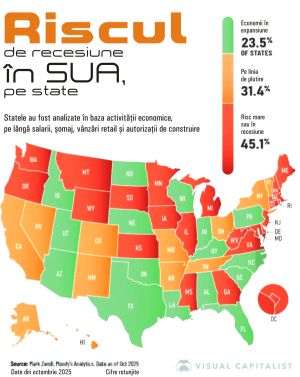The public agenda in Romania is dominated by the SIPA scandal, and, more recently, by the activity of the Parliamentary Investigation Commission concerning the presidential elections of 2009. There is no more room for anything else and much less for the issue of the switch to the Euro.
In April 2017, chaired by the prime-minister and with the participation of two vice-presidents - finance minister and the governor of the NBR - we had the meeting of the Interministry Committee for the switch to the Euro. What's next is for the government to present to the European Commission a plan of action for the switch to the Euro, which obviously should include a timeline provision (the latest deadline, 2019, has been abandoned, without anybody actually taking it seriously). We can only praise that decision.
We would have expected that topic to become part of the public agenda and to start a series of debates with a dual goal: the clarification of terms and the steps to take to switch to the Euro; and providing information to people about the process. Unfortunately, it just wasn't meant to be.
Some reflections of the participants to this Interministry committee raises serious questions for most of the people interested on the subject. When we judge an opinion or another, it is a good thing to look at the real interests of those who hold those opinions. For instance, if we ask an exchange office owner or those in the arbitrage offices of banks, we will probably find that Romania will never be ready to switch to the Euro, because these operators earn income from the conversion between lei and Euros.
Let's take them one at a time.
There is already an almost generally accepted opinion, according to which the meeting of the five convergence criteria, stipulated by the treaties of the European Union, would not be enough for the switch to the Euro. It also takes a certain degree of real convergence, characterized first and foremost, by the GDP per capita, by the purchasing power parity, which should be closer to the average one in the Eurozone. According to some people, 70-75% of the average of the Eurozone would be adequate (why 70-75 and not 65 or 80 is harder to argue). Currently, Romania's GDP per capita nears 60% of the EU average.
For the supporters of this opinion, who keep raising the bar, I once again come with the following question: if, for a long time, Romania remained stuck in the area of products and services with added value that is lower than the average of the Eurozone, does that mean that we won't be able to switch to the Euro? My point of view is that we can switch to the Euro, as long as we manage to live within the limits of our revenues, correlated with productivity. Let's not forget that, in the context of convertibility of the nation's currency, there is a continuity and mutual influence between the internal and external balances. Currently, the inflows of foreign currency in Romania, through the remittances made by Romanians working abroad, the European funds and the positive foreign balance of payments, supported, among other things, by a certain structure of the economy (with many productive services, such as cabling), are more than satisfactory. As a result, the management of Romania's international reserves has a issues of surplus rather than shortage. The increase of the added value, incorporated in the products and services made in Romania, which will allow the increase of the revenues, depends heavily on the move of these products and services from competitive advantages based mainly on costs towards competitive advantages increasingly generated through differentiation, (respectively through innovation). Or, that process can take decades and no one can guarantee that Romania won't be stuck in the trap of average income countries, who fail to make the switch to the status of countries with a high standard of living.
More recently, the idea started making the rounds that the switch to the Euro can only be sustainable if the we reduce the gaps in development between the various regions of the country. This new idea, if it were to be accepted, would push the adoption of the Euro to a very distant date (that's just so we don't say, never). Let's look at Germany who pumped tens of billions of Marks and Euros in the regions of former Eastern Germany, with real convergence still not achieved to this day. It's not even worth discussing the differences between Southern and Northern Italy. Italy's financial issues do not come first of all from the Euro, but from overindebtedness, the recklessness of some private banks and the loss of competitiveness. There is lots of talk about the huge difference between the GDP of Bucharest and that of other regions, without taking into account the fact that in Bucharest is where the main banks and multinationals that operate in Romania are headquartered.
And for the outlook of the move to the Euro to become even more nebulous, there is now the talk about cultural gaps. We should remember that after 1945, Romania went almost 45 years through the process of "creating the new man", which d disappeared the second day after December 1989, as if he never even existed.
Today, in Romania, all the significant transactions are calculated in Euros, even though some of them are paid in lei. And "homo economicus" is in every man; all they need is the freedom to make decisions. In the end, the entire economy can be reduced to four words: people respond to incentives! Let's remember the skill of currency dealers on the black market, I the first years of transition, when the currency exchanges were not yet fully liberalized. In order to take their profit, they would keep their dollars in packs, depending on the exchange rate they got them at. I don't think that Romanians will have "cultural shocks" if they were to only operate in Euros, given that the vegetables traders in markets watch the exchange rate to see whether or not they should raise their prices for carrots, radishes, tomatoes, cucumbers, etc.
Of course, we are living on the outskirts of the East, where there is no rush. The president of the European Commission, who recently visited our country, when listening to the questions of some politicians, about how Romania didn't want a two-speed Europe, gave us an answer that is worth thinking on: the current treaties of the European Union stipulate the possibility of a 2-speed Europe and it is up to every member state on where it wants to find itself.
The trends in the European Union indicate a desire of the member states in the Eurozone to move faster towards integration (there is talk of a common budget of the Eurozone and even of a parliament of the Eurozone...). Member states from outside the Eurozone can not oppose those trends.
Romania will have the presidency of the European Union, in the first half of 2019, but unfortunately, Romania's weight in the decision making process for the decisions that concern the Eurozone will be low, because we are not yet part of it.
I wish that this once at least, the intention of drawing up a plan of action for the move to the Euro, as well as the switch of this plan to be taken seriously by every politician and institution of the state that are concerned. Let's not forget that Romania, when it was accepted in the European Union, made the commitment to take all the necessary steps to carry out the conditions needed for the adoption of the Euro!























































